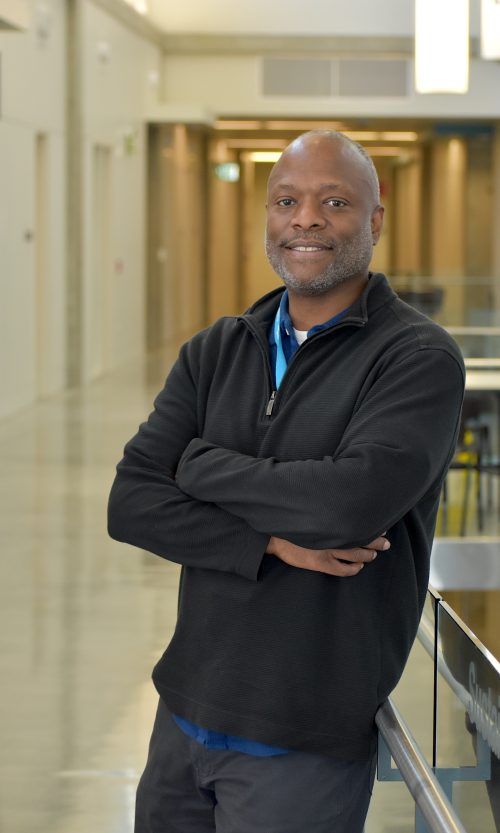With billions of dollars at stake, a PCC class becomes essential for growing the semiconductor workforce
Photos and story by James Hill
The passage of the CHIPS and Science Act (CHIPS Act) sparked historic investments in the U.S. semiconductor manufacturing, research and development fields. The $52.7 billion investment is expected to drive demand for highly trained workers throughout the industry’s complex production processes.
On top of that, Oregon lawmakers passed the Oregon CHIPS Act in 2023, allocating $240 million to 15 companies planning expansions, with the goal of cementing Oregon’s position as a global center of the semiconductor industry. Oregon officials expect $40 billion in new semiconductor investment in the coming years, which they anticipate will create 6,300 direct new jobs and 1,000 construction jobs in the state. This activity will spur opportunities for upskilling Oregon’s workforce and creating a pipeline of new workers to fill these jobs.
Current educational pathways leading to the semiconductor workforce must expand to meet the scale of the CHIPS Act investments. This has become a priority at the state and federal levels.
Semiconductor Training
PCC has built a healthy semiconductor pathway to address the worker shortage. From short-term introductory courses to the industry offering programs like Quick Start to two-year degrees in microelectronics and electronic engineering, PCC offers many options to learn the principles of advanced manufacturing that provide pathways to living wage jobs and long-term careers in semiconductors.
“If we connect young people to the opportunities that they want; that is the only way that we’re going to fully unleash the promising talents of working people across America,” said Acting Secretary of Labor Julie Su at a Portland Community College event earlier this year.
With billions of dollars at stake, a PCC class is essential for laying the foundation to grow the local semiconductor workforce. The Connect to Semiconductor Essentials course provides 17-24 year olds interested in the semiconductor industry to start a no-cost journey to plan their next steps of study at PCC or develop in-demand essential skills to find a great job.
“These are individuals who might want to explore what they want to get into or are specifically interested in the manufacturing and technology industry,” said Prentice Davis, trainer and education specialist. “The class itself is a five-week, 45-hour course that is taught by current and former Intel employees in our mechatronics lab so students get a sense of the power of place. And the lab has a few machines donated to us by the company. The instructors give students an opportunity to hear first hand about the culture of Intel and other manufacturers.”
Funded by an Intel Mindshare Grant and by Washington County through the American Rescue Plan Act, the class is a direct derivative of the popular Quick Start Program (also an Intel partnership), but is different in that it fuses technical skill training with essential skills development for younger adults and and prepares them for success at PCC.
“Essential skills are ‘employability’ skills as we call them,” he said. “They mean workplace communications, collaboration and problem solving. We hear from employers all the time about individuals that come to them who have degrees but lack those essential skills they need to be successful.”
The essential skills are fused with technical skills where students learn electrical circuits, safety, and clean room protocols.
“Students actually get to ‘gown up’ in the white bunny suits,” he said. “We do a tour of a local manufacturer, which really crystallizes a lot of the learning because they get to see actual processes in action.”
Once students complete the class, they can transition into a PCC program like microelectronics or electronic engineering to earn further credentials and degrees. Or staff assist them in exploring other careers if semiconductors isn’t a field they want to pursue further. The class helps provide students, and eventually workers, who are aware of the job requirements and will be far less likely to quit.
“Employers took the time, money and resources to hire someone and if that individual goes into that environment and realizes they don’t want to do it, we work with them to take the next step at PCC,” Davis said. “If we had it our way, 100% of the students would onboard to PCC as quickly as they could. But we realize that there is an exploratory nature of this program and so some are inclined towards technology and manufacturing while others may not be so sure. Great part about it is that we accept all comers.
“For those individuals who make the decision that ‘Hey, maybe this is not for me,’ we operate according to an internal ethic of a warm hand off as we have a number of services in our building like Worksystems and the Oregon Employment Department so it’s easy for us to make a direct referral,” he continued.
PCC remains engaged in local, state and national conversations to grow the semiconductor industry. The college participated in the Oregon Semiconductor Competitiveness Task Force, and, alongside Intel, successfully advocated for the first investments in community college semiconductor workforce training from the State Legislature. In addition, PCC remains a strong partner in the Advanced Manufacturing Training & Education Collaborative of Hillsboro to further support industry and training needs.
“We have a long history of training the workforce for semiconductor and advanced manufacturing careers,” said PCC President Dr. Adrien Bennings. “Our academic pathways alone offer multiple avenues to not just degrees but short-term certificates. All of these lead to living wage jobs, which is so critical in positioning our citizens to not only thrive but to have that economic mobility.”
For more information on the Semiconductor Essentials Training, visit https://www.pcc.edu/opportunity-center/jobs/

